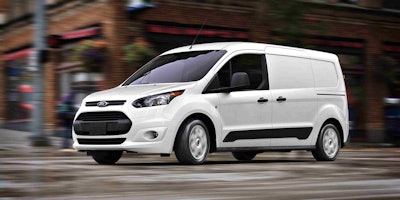 Ford Transit Connect compact commercial van equipped with 2.5-liter I-4 engine gains flex-fuel capability and new seating options for 2016.
Ford Transit Connect compact commercial van equipped with 2.5-liter I-4 engine gains flex-fuel capability and new seating options for 2016.Did Ford cut into its Transit Connect sales after introducing the Transit to the U.S. in 2014?
The automaker that continues to dominate the U.S. van market says no.
“It’s important to note that Transit Connect sales were not adversely affected by the introduction of Transit,” explains Yaro Hetman, Ford brand manager for Transit, Transit Connect and E-Series.
“In fact, 2015 was Transit Connect’s best sales year in history, with total sales up 24 percent over 2014.”
From a maneuverable short wheelbase Transit Connect all the way up to a high-roof, extended wheelbase Transit, Ford is continuing to expand its van options and is expanding its customer base as a result.
Ford has proven that the market is big enough for both of its vans and demand keeps rising.
“Ford invented the compact commercial van market with the introduction of Transit Connect in 2009, and we continue to sell more compact vans than anyone else,” Hetman says.
It seems, however, that bigger may be better. Transit Connect’s larger sibling, Transit, continues to outsell Transit Connect.
In May, sales for Transit Connect numbered 4,390 compared to Transit sales at 13,640.
“Although Transit Connect sales represented more than half of the small vans sold that month (8,219) we still sold more than three times as many full-size Transit vans,” Hetman says.
Ford told Hard Working Trucks that they don’t track customers who may be switching from traditional cargo vans, like the E-Series, to their Euro-style vans.
“Van choice really is dictated by application—what do you need this piece of mobile equipment to do for you? Someone who wants more of a “traditional” van may consider a Transit Connect, but would probably also consider a regular wheelbase, low-roof Transit van,” Hetman explains.









